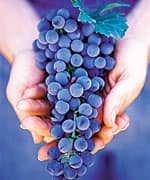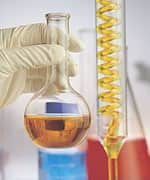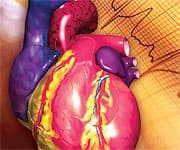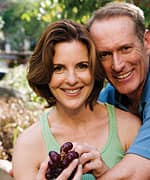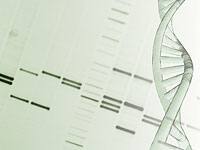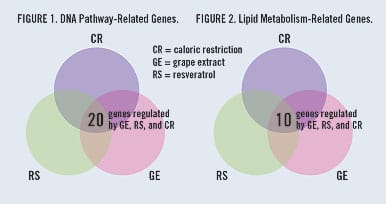Life Extension Magazine®
The Life Extension Foundation has a 27-year history of introducing cutting-edge therapies for extending life and preventing disease. In 2003, we reported on findings that resveratrol (a substance found in red grapes and other plants) extended the life span of certain cells by as much as 70%. Since our initial report, resveratrol has continued to demonstrate extraordinary potential in prolonging life. In numerous studies—including those at BioMarker Pharmaceuticals, a Life Extension-sponsored research institution—resveratrol has demonstrated effects that mimic those of caloric restriction, the best-documented anti-aging strategy to date. In all animals in which it has been tested, caloric restriction—the practice of restricting calorie intake while maintaining good nutritional status—improves multiple aspects of age-related decline. Caloric restriction does this, in part, by producing changes in gene expression that are associated with long life and a slowing of the aging process. Resveratrol is also gaining growing recognition for its promise in fighting age-related diseases ranging from dementia to diabetes. For example, the National Institutes of Health is currently sponsoring a clinical trial investigating resveratrol’s ability to fight colon cancer. In this article, we bring our readers up to date on the latest clinical research on resveratrol, and why leading researchers believe this remarkable nutrient may hold the key to living a longer, more vibrant, disease-free life. What you need to knowPre-clinical results in scientific literature have shown that resveratrol extends lifespan and delays disease. However, the dosages used vary from study to study making it difficult to find the right dosages. In addition, research shows it is not just resveratrol alone that offers these benefits, but many of the compounds found in the grapes, as well. We at Life Extension® analyzed the data to figure out what was the most effective study, and what the human equivalent dose of resveratrol should be to optimally utilize its health benefits. Resveratrol and Caloric RestrictionTo date, the most reliable, best-researched way to extend life span is through the practice of caloric restriction, which involves reducing calorie intake while simultaneously maintaining good nutritional status. In numerous studies, restricting calorie intake in laboratory animals has been shown to prolong their life span by as much as 60%.1-3 While scientists have not yet determined whether caloric restriction extends life span in humans, the preliminary evidence is very promising. In humans, consuming a low-calorie diet is associated with several possible markers of greater longevity, such as lower insulin levels and reduced body temperatures, along with less of the chromosomal damage that typically accompanies aging.4 Furthermore, people who consume a low-calorie diet may be less prone to diseases associated with being overweight or obese, such as metabolic syndrome, diabetes, cancer, and atherosclerosis. Although caloric restriction may be effective in promoting longevity, the problem is that most adults find this stringent lifestyle strategy to be impractical. As a result, scientists have sought to uncover the precise mechanisms by which caloric restriction promotes longevity, in order to help people capture its life-extending benefits through more practical means. Resveratrol Offsets Perils of a High-Calorie DietRemarkable new research suggests that it may be possible to achieve the life-extending benefits of caloric restriction using the readily available, plant-derived compound known as resveratrol. Resveratrol and caloric restriction appear to work via similar mechanisms to promote health and longevity in numerous animal species. In an interview, a leading resveratrol researcher, Dr. Xi Zhao-Wilson of BioMarker Pharmaceuticals, told Life Extension, “There has been a great deal of attention focused on resveratrol in the past few years, following a study showing that resveratrol activates molecular pathways involved in life-span extension, now demonstrated in yeast, worms, flies, fish, and mice, and which possibly bear a relationship to mechanisms under-lying caloric restriction.”
This heightened interest in resveratrol has produced several recent breakthroughs. In a landmark study, Harvard University scientists showed that resveratrol could prolong survival by regulating a gene associated with aging that is present in all life forms.5 They demonstrated that while middle-aged mice fed a high-calorie diet suffered the ravages of obesity—including metabolic changes resembling diabetes, liver and heart damage, and premature death—mice that were fed resveratrol in addition to the high-calorie diet actually exhibited beneficial changes in their physiology, resembling those of mice fed a standard diet.5 Among the life-prolonging benefits of resveratrol supplementation demonstrated in the study were:
While mice on the non-supplemented high-calorie diet developed enlarged, fatty livers, resveratrol supplementation prevented these changes. Similarly, heart disease and evidence of atherosclerosis were seen in mice fed the high-calorie diet, but not in those that were also given resveratrol. Resveratrol significantly increased survival, reducing the risk of death from the high-calorie diet by 31%. Together, these findings offer powerful evidence that resveratrol protected the animals from the harmful effects of a high-calorie diet.5 Resveratrol’s positive impacts on insulin sensitivity and survival were apparent after only six months of treatment.5 Resveratrol also improved the animals’ quality of life, as reflected in their physical abilities. On a test of balance and coordination, the resveratrol-fed mice on the high-calorie diet steadily improved as they aged.5 The obese resveratrol-supplemented animals experienced all of these benefits without a significant reduction in body weight.5 “These data demonstrate that resveratrol can alleviate the negative impact of a high-calorie diet on overall health and life span,” the Harvard scientists concluded. “The ability of resveratrol to prevent the deleterious effects of excess caloric intake and modulate known longevity pathways suggests that resveratrol and molecules with similar properties might be valuable tools in the search for key regulators of energy balance, health, and longevity.”5
Mechanisms by Which Resveratrol May Extend LifeToday, scientists around the world are studying resveratrol to determine how it helps fight aging and prolong life span. Current evidence suggests that resveratrol exerts antioxidant effects, boosts energy production, and favorably alters patterns of gene expression. Oxidative stress is implicated in numerous disease processes and in aging itself. Resveratrol demonstrates powerful antioxidant capabilities, with profound implications for human health. Scientists report that resveratrol inhibits the oxidation of dangerous low-density lipoprotein (LDL) and scavenges harmful hydroxyl radicals. Resveratrol also helps preserve levels of glutathione, one of the body’s most essential antioxidants.6 According to prominent resveratrol investigator Dr. Milos Sovak, “There is no question that resveratrol is one of the best free-radical scavengers and that it has many effects whose ramifications might affect not only longevity but also general health.” Resveratrol stimulates energy production in the cellular powerhouses known as the mitochondria. Diminished mitochondrial energy production is associated with reduced longevity. By enhancing the production of life-sustaining energy, resveratrol may help protect against metabolic disease and obesity, thereby improving health and prolonging survival in animals.7 Growing evidence indicates that resveratrol influences many genetic pathways, which may underlie its ability to lengthen life. In the recent Harvard study, investigators noted that a high-calorie diet produced numerous changes in gene expression. However, supplemental resveratrol opposed the effects of this high-calorie diet in 144 of 153 significantly altered genetic pathways. Moreover, resveratrol’s effects were dose dependent, with larger amounts yielding greater effects, leading the investigators to suggest that resvera-trol may offer “new approaches for treating obesity-related disorders and diseases of aging.”7 Some of the genetic pathways influenced by resveratrol are similarly affected by caloric restriction. For example, caloric restriction is associated with long-term activation of AMP-activated kinase (AMPK), a metabolic enzyme promoting insulin sensitivity and fatty-acid oxidation. Resveratrol likewise increases AMPK activity, which is associated with life-span extension.5 Scientists believe that caloric restriction increases life span in part through its effects on the sirtuin genes.5 Present in all life forms, sirtuin genes are associated with aging and longevity. Resveratrol may confer benefits similar to those of caloric restriction by influencing the sirtuin gene known as SIRT2.5,8-10 In the Harvard study, resveratrol helped counteract changes in SIRT2 expression induced by a high-calorie diet.5 “The genes and pathways [affected by resveratrol or by caloric restriction] are related to activation of sirtuins, a class of histone deacetylase enzymes (HDACs) involved in cell death and life-span regulation,” Dr. Zhao-Wilson told Life Extension. “Based on the large body of evidence, the resveratrol/sirtuin activators have become the focus of pharmaceutical drug discovery efforts now [targeting] HDACs.” Researchers believe that compounds like resveratrol that either activate or inhibit sirtuin activity may have therapeutic potential for a broad array of human diseases, including cancer, diabetes, heart failure, and neurodegenerative conditions such as Alzheimer’s and Huntington’s disease.11
|
|||||
Specific Health Applications of ResveratrolWhile resveratrol’s impact on cardiovascular disease has undergone the most scrutiny to date, researchers are also exploring its effects on a broad array of diseases, including cancer, arthritis, diabetes, and Alzheimer’s.16,17
Cardiovascular HealthOne of resveratrol’s most studied applications involves the prevention of cardiovascular disease. “The cardioprotective effects of resveratrol have been studied for years, based largely on the association of wine consumption with reduced risk of coronary heart disease,” notes Dr. Zhao-Wilson. This plant-derived compound appears to act through several mechanisms to protect the cardiovascular system. Resveratrol may inhibit platelets from clumping together, thus reducing the risk of deadly blood clots that can lead to heart attack and stroke.18-21 Furthermore, resveratrol helps improve blood flow by exerting beneficial effects on the linings of small blood vessels, known as the endothelium. This is a critical finding, since endothelial dysfunction is believed to underlie the progression of atherosclerosis.22-24
CancerIn addition to its cardioprotective effects,25-27 resveratrol exhibits a range of anti-cancer properties.28 In laboratory cell studies, resveratrol has been found to inhibit the growth of numerous types of cancer, including leukemias, multiple myeloma, melanoma, and cancers of the breast, ovaries, prostate, stomach, colon, liver, pancreas, thyroid, uterine cervix, and head and neck.29,30 Resveratrol suppresses tumor growth by increasing or decreasing the production of various enzymes and molecules that regulate cellular reproduction and blood supply to the tumor.30,31 Through these mechanisms, resveratrol may enhance the anti-cancer effects of chemotherapeutic drugs and radiation.29 With its potent antioxidant capabilities,32,33 resveratrol may even protect healthy tissues from damage induced by chemotherapy. Since chemotherapy harms both healthy and cancerous tissues, this finding may have important applications in helping cancer patients tolerate its effects.34 Clinical trials in humans have shown that resveratrol has an excellent safety profile, and structural modifications of resveratrol with improved bioavailability are being studied as potential anti-cancer treatments.29 “Resveratrol is currently the subject of National Institutes of Health-sponsored clinical studies to evaluate its chemoprevention (cancer-preventive) effects,” according to Dr. Zhao-Wilson. An ongoing clinical trial at the University of California is studying resveratrol in patients with colon cancer.
Inflammation and ArthritisA common culprit in heart disease, cancer, and arthritis is chronic inflammation, mediated by naturally produced compounds in the body known as prostaglandins and cytokines. By blocking the activity of such inflammatory compounds, resveratrol may have therapeutic applications for all of these conditions.35,36 In a recently published study, scientists reported that resveratrol shows promise as a potential therapy for arthritis. When administered to animals with experimentally induced inflammatory arthritis, resveratrol protected cartilage against inflammatory changes related to the disease.37 NeuroprotectionResveratrol shows promise in protecting the brain and nervous system against disorders associated with aging and genetic factors. In laboratory studies, resveratrol’s antioxidant effect has been shown to protect against nerve cell damage caused by beta-amyloid peptide, which accumulates in the brains of Alzheimer’s sufferers.38-40 This has led several research teams to propose that resveratrol may be a useful treatment for Alzheimer’s disease.41-43 According to a recent report, resveratrol demonstrated a protective effect against Huntington’s disease in animal models.44 Huntington’s is a genetic disease associated with impaired motor skills and reduced mental abilities. Additionally, grape seed extract appears to protect rat brain cells and maintain the overall viability of the nervous system. Grape seed exerts these effects by modulating proteins implicated in cognitive disorders.24 DiabetesResveratrol may offer benefits in preventing or managing conditions associated with high blood sugar, such as metabolic syndrome or diabetes. Sirtris Pharmaceuticals, a company founded by Dr. David Sinclair, leader of the Harvard resveratrol study, is conducting a clinical trial to evaluate resveratrol’s effects in controlling blood sugar in patients with diabetes.
| ||||||
Extending human life spanBased on his study of experimental life-span extension in mice,45 Dr. Richard A. Miller of the University of Michigan suggests that resveratrol may extend the human life span. Dr. Miller speculates that with effects similar to those of caloric restriction, resveratrol could extend human longevity to about 112 or even 140 years of healthy life. Practical Considerations for Optimal SupplementationWhile plentiful data attest to resveratrol’s potential benefits for health and longevity, certain practical concerns must be addressed to obtain its optimal effects as a dietary supplement. These include resveratrol’s stability, shelf life, dosage, and the variability of different available preparations. Even today, much remains to be learned about the pharmacokinetics of resveratrol—that is, how it is absorbed, utilized, broken down, and excreted in humans. BioavailabilityLaboratory and animal studies clearly show that resveratrol and its derivatives are biologically active. However, Dr. Zhao-Wilson notes that there are “significant issues related to what is currently known about resveratrol’s bioavailability—it appears to be rapidly metabolized in humans.” Dr. Sovak agrees, commenting, “One problem with resveratrol is that we do not know that much about its resorption and bioavailability in humans, but as expected, the compound is rapidly metabolized and excreted.”
Scientists are exploring ways to optimize resveratrol’s pharmacokinetics. For example, in the Czech Republic, where resveratrol has been approved as a nutritional supplement, Dr. Sovak and his colleagues conducted a pilot study in humans comparing high-purity, pharmaceutical-grade resveratrol to resveratrol glycon, the natural form of resveratrol extracted from the Polygonum plant. Of the two preparations, resveratrol glycon was found to be more easily absorbed in the body and to have better pharmacokinetics. Another method under investigation to improve resveratrol’s bioavailability is administering it concomitantly with plant-derived flavonoids. Numerous studies suggest that the bioflavonoid quercetin slows the inactivation of resveratrol, thus improving its bioavailability.46,47 A novel type of quercetin, quercetin chalcone, demonstrates superior absorption and solubility, and may thus be the optimal form of this bioflavonoid.48 StabilityPreviously, scientists were concerned that the clinical usefulness of certain resveratrol-encapsulated preparations could be limited by poor stability, limited shelf life, or exposure to light and air. However, recent stability studies by Dr. Sovak and his colleagues at the Czechoslovak company Interpharma Praha have demonstrated these concerns to be unjustified. Resveratrol is generally stable for at least two years and does not require special packaging or storage.49 PurityNot all resveratrol preparations are of equal quality. “As for the variability of different available preparations, this is always an issue with respect to manufacturing and quality control associated with dietary supplements in general,” says Dr. Zhao-Wilson. “It is ‘buyer beware,’ and one must find a high-quality source with a vested interest in providing consumers with the best available products and scientific evidence to back them up.” Dr. Sovak agrees, and recommends only pure forms of resveratrol for study and consumption. Interpharma Praha has developed technology to produce high-purity resveratrol and resveratrol glycon according to GMP (good manufacturing practice) standards. DosageIn addition to exploring resveratrol’s many potential health applications, researchers are also trying to determine the optimal dose needed to capture its benefits. “There have been insufficient studies to date in humans to address issues related to optimal dose,” notes Dr. Zhao-Wilson. “Extrapolation of optimal dose from animal studies to humans is always more of an art than a science, and the appropriate studies still need to be done. Nevertheless, reasonable assumptions can be made, and there is even evidence that low doses may be effective for certain conditions.” Many commercially available supplements provide 20 mg of resveratrol daily. The rationale behind this dosage is that prior to the widespread use of pesticides, French red wine contained approximately 20 mg of resveratrol per liter, and those drinking about a liter daily appeared to derive the cardioprotective benefit associated with the French paradox. Now that the resveratrol content in red wine has decreased to 90 micrograms per fluid ounce,50 a 20-mg (20,000-mcg) resveratrol supplement contains approximately 220 times the amount of resveratrol in one fluid ounce of red wine, or about 41 times the amount in one glass of red wine. Studies by BioMarker have shown that resveratrol offers benefits for gene expression and longevity in a variety of species using a dosage comparable to 20 mg daily in humans. However, given the extraordinary findings of recent studies using high-dose resveratrol supplements—and their profound implications for human health—some resveratrol researchers and other health-conscious people are now consuming even larger daily dosages. As for who should supplement with resveratrol, leading researchers maintain that in addition to benefiting patients with specific disease conditions, resveratrol may confer broad-spectrum protection to anyone seeking to live a long life in optimal health. According to Dr. Zhao-Wilson, “the properties associated with resveratrol appear to be largely protective—cardioprotective, neuroprotective, anticarcinogenic, anti-inflammatory—and the current data suggest that most people could benefit from dietary supplementation with resveratrol obtained from a high-quality source.” Dr. Zhao-Wilson adds that resveratrol is generally safe when taken in conventional dosages. Dr. Sovak similarly recommends resveratrol as a health-protective agent, noting that resveratrol may be helpful both alone and in combination with other antioxidants, such as epigallocatechins derived from green tea.51,52 Turn to the next article for more precise information about optimal resveratrol dosing.
| ||||
| In response to the many media reports about resveratrol, it seems like every supplement company is offering some form of grape complex for sale that claims to contain some resveratrol. Recent attention has focused on a publication in the journal Nature that demonstrated improved health and survival in mice fed a high-fat diet supplemented with resveratrol, the same flavonoid that has been shown to increase the life span of a variety of organisms, including yeast, worms, flies, fish, and mice.1-5 This research tied the beneficial effects of resveratrol to mechanisms that underlie caloric restriction, and showed that such approaches could be used to treat certain chronic disorders and diseases of aging. However, some popular press reports that accompanied this scientific article generated a fair amount of controversy, especially related to the dose used in the experimental mice and the estimated human-equivalent dose that may be required to exert the same biological effects. The Life Extension Foundation, however, is the only organization that has taken a grape-seed/resveratrol product already being used by health-conscious individuals and shown that the favorable biological effects of resveratrol can be achieved at a dose that is more than 10-fold lower than that used in the most-referenced study (referred to as the Harvard study). Just recently, Life Extension reported that experimental animal studies conducted by BioMarker Pharmaceuticals were under way using the same grape extract fortified with resveratrol that is currently used by Foundation members.6 These studies were designed to evaluate the gene-expression response in mice fed resveratrol from the whole-grape extract found in the Grapeseed Extract with Resveratrol encapsulated product. The gene-expression data obtained from the grape extract group were compared to data from a group of animals subjected to caloric restriction. The preliminary data suggested a significant overlap in the favorable pattern of gene expression between the grape extract-fed mice and the calorie-restricted mice. In addition, experimental fruit flies (Drosophila) fed grape extract showed improvement in a model of Parkinson’s disease, as well as an extended life span. These findings paved the way for further analysis identifying the specific molecular pathways involved in these effects. Here we provide an update to these earlier findings. Resveratrol and Other Health-Promoting Grape ConstituentsThe Life Extension Foundation constantly surveys the scientific literature in order to utilize the most important findings in promoting health and extending life. Mounting evidence demonstrates the broad-spectrum effects of biologically active molecules such as resveratrol, which is derived from natural plant extracts. In nature, molecular compounds like resveratrol are found in complex mixtures containing a diverse array of physiologically relevant molecules. Many of these constituents may be required in order to provide phytomedicinal agents with optimal bioavailability and synergistic action. Scientists must consider these points when conducting studies using either a single phytochemical (such as resveratrol alone) versus resveratrol combined with grape skin and grape seed extracts. Classes of molecules found in natural whole grape, grape skin, and grape seed extracts include potent effectors like proanthocyanidins (in grape seed), anthocyanins (which give purple and red grapes their color), and single molecular entities such as resveratrol and quercetin. Scientific studies document the multiple health effects of these components, which can be characterized as antibiotic, anti-tumor, anti-diabetic, anti-ulcer, cardioprotective, anti-inflammatory, and anti-brain aging.7 The cardiovascular health benefits of grape seed extract include favorable effects on blood pressure, enhanced endothelial function, and decreased oxidative stress.8 The potent antioxidant activity of grape seed extract may be responsible for its reported neuroprotective effects, as observed in animal models of Alzheimer’s disease.9,10 Recently, grape seed extract combined with calcium was found to be more effective than calcium alone in building healthy bone mass.11 Grape seed extract has effectively inhibited the growth of human colorectal tumor cells in the laboratory and in animals.12 Recent findings on resveratrol’s effects in experimental animal models are attracting a great deal of interest from the scientific community, while raising many questions about resveratrol’s applications in humans. One of the most intriguing questions is what dose of resveratrol may help humans achieve the beneficial health effects that have been observed in animals. While extrapolating animal dosage to human dosage is difficult at best, scientists are using several approaches to address this question. The accumulating data from gene-expression studies in mice provide some clues. These findings are also helping to illuminate the molecular basis of the biological effects of resveratrol and grape extracts. The Harvard Study generated a great deal of enthusiasm by showing that mice fed high-fat diets (60% of calories from fat) avoided numerous diet-related health problems when supplemented with resveratrol. Compared to mice that were not given resveratrol, the supplemented mice exhibited increased survival, increased insulin sensitivity, decreased organ pathology, and in-creased numbers of mitochondria.1 Resveratrol was also responsible for shifting the gene-expression patterns of mice on the high-fat diet towards those of mice on a standard (moderate-fat) diet. These results were achieved by feeding the mice a daily resveratrol supplement equivalent to 22.4 milligrams per kilogram of body weight.* In preliminary studies of this type, scientists often choose relatively high individual doses that are likely to generate an observable effect. Typically, more formal dose-ranging studies would be conducted later to identify optimal doses to attain specific effects. This is partly responsible for the controversy in the popular press regarding the relatively high dose of resveratrol used in this study. While the Harvard study was under way, BioMarker Pharmaceuticals had already completed an eight-week controlled feeding study in which mice received either resveratrol (a synthetic version) or grape extract (containing resveratrol and other constituents), along with a “normal” diet. Gene-expression profiles were completed on these animals and compared to those of a group of calorie-restricted mice. Genes affected by either resveratrol formulation (synthetic or natural grape extract) or by caloric restriction were then compared. Importantly, the resveratrol dosage used in this study was much lower—approximately 12-fold lower—than that used in the Harvard study (see Table 1).
Results of Gene-Expression AnalysisMice on normal diets were fed a daily, relatively low dose of resveratrol obtained from either a synthetic source or from a whole-grape extract enriched with resveratrol. A control group of mice fed a normal diet without resveratrol supplementation and a calorie-restricted group were also evaluated. Total calorie intake was identical in the resveratrol, grape extract, and control groups, and 40% less in the calorie-restricted group. At the end of an eight-week feeding schedule, the animals’ livers were harvested in order to prepare RNA (the biochemical cousin of DNA) for gene-expression profiling. The samples were specially prepared for analysis with DNA microarrays, or “gene chips,” containing a full set of characterized mouse genes (the Affymetrix GeneChip® contains a total of over 45,000 probe sets, representing a complete set of over 34,000 genes of the mouse genome). Gene-expression levels were determined using statistical methods that ensure a high degree of confidence in the data.* Both mouse groups that received resveratrol showed significant changes in the expression of key genes, confirming that even at the relatively low doses used in this study, there was a notable biological effect. The differentially expressed genes control over 100 different molecular pathways, including those related to metabolism (primarily metabolism of carbohydrates and lipids), DNA repair, and the regulation of cell death. Since the genes involved are in key biological pathways, they are likely to be responsible for at least some of resveratrol’s biological effects. Furthermore, significant results were achieved using a dose of synthetic resveratrol that was more than 10-fold lower than that used in the Harvard study. Animals fed grape extract received resveratrol and other components of whole-grape extract.** Their gene-expression response would therefore be expected to reflect effects of both resveratrol and other grape components. Genes that significantly changed in expression in the grape extract group are found in molecular pathways involved in carbohydrate metabolism and biosynthesis (such as the creation of blood sugars), and lipid metabolism and biosynthesis (such as the creation or reduction of cholesterol and fatty acids). Interestingly, scientists noted a significant overlap—about 65%—when they compared the gene-expression patterns of the resveratrol and grape extract groups. While expected, these results confirm the similar effects of pure synthetic resveratrol and grape extract-derived resveratrol on gene expression in animals. The gene-expression effects of “low-dose” resveratrol were similar to those seen in calorie-restricted mice: about 55% similarity between the calorie-restricted and resveratrol groups, and 52% similarity between the calorie-restricted and grape extract-supplemented groups.
A method known as molecular pathway analysis can be applied to the gene-expression profiling results in order to identify the key regulatory pathways affected by the various treatments of resveratrol, grape extract, and caloric restriction. Displayed in Figures 1 and 2, these data show which pathways are specific to the different treatments, as well as pathways that are shared between or among the treatments. Figure 1 shows the results for genes in pathways that are related to biological processes involving DNA; as shown by the overlap, 20 differentially expressed genes involved in DNA-related processes are regulated in the same fashion in animals receiving synthetic resveratrol, grape extract, or caloric restriction. These data suggest that the three treatments share some common features with respect to how genes involved in DNA processing are controlled through gene expression. A similar approach was used to analyze genes involved in lipid metabolism. As shown in Figure 2, 10 genes involved in pathways related to lipid metabolism are commonly regulated by resveratrol, grape extract, and caloric restriction. These data are just a subset of the entire analysis. In total, 159 different molecular pathways were found to be commonly regulated by these three different treatments. Resveratrol and grape extract produce strongly similar effects, based on the gene-expression responses demonstrated in mice fed a relatively low dose of these compounds. Comparison of these groups with calorie-restricted mice shows a significant overlap in the three treatments’ regulation of similar biological pathways. These data add to the accumulating evidence that resveratrol triggers a biological response in mammals that is similar to that observed with caloric restriction, an intervention that is known to extend life span and protect against age-related diseases.2-5 These effects are observed even at a relatively low dose of resveratrol, indicating that a human-equivalent dose can be obtained through dietary supplementation with high-quality resveratrol products. What This Means to Aging Humans TodayA fluid ounce of red wine averages around 90 micrograms of resveratrol.13 The resveratrol supplements used by Life Extension members contain 20 mg (20,000 mcg) of resveratrol in each capsule. Therefore, these 20-mg resveratrol supplements provide approximately 220 times the amount of resveratrol found in one fluid ounce of red wine. Since a glass of wine is approximately 5 and 1/3 ounces, a person taking one 20-mg resveratrol supplement may ingest the equivalent amount of resveratrol found in 41 glasses of red wine. Needless to say, that is a lot of red wine. In the studies conducted by BioMarker Pharmaceuticals, mice demonstrated favorable anti-aging gene-expression changes in response to receiving the human equivalent of 20 mg of resveratrol a day. The very positive study results reported in the media in late 2006 used human-equivalent doses of resveratrol in the hundreds or thousands of milligrams a day. So what we have now are extremely favorable data on resveratrol (along with other grape constituents), with a wide range of probable optimal doses for aging humans to consider. Those who choose to consume 20 mg of resveratrol a day can take comfort in the BioMarker research showing that this potency exerted impressive changes in critically important genes involved in various aging processes and degenerative diseases. Those who choose to consume higher doses of resveratrol can look at the media-reported studies that also showed very impressive results. The good news for consumers is that they can obtain standardized resveratrol and other grape constituents in 20 mg and 100 mg capsules, at a very moderate cost. Footnotes: * Doses of drugs in experimental animals are often calculated in milligrams (mg) per kilogram (kg) of body weight. This enables the doses to be standardized among treatment groups. ** A threshold p-value of 0.001 for a minimum two-fold change in level of gene expression was used; this means that the probability that the gene-expression level is statistically significant is 99.9% or more. *** Polyphenolic acids, flavonoids, anthocyanins, and oligomeric proanthocyanidins. | |||||||||||
| References for "Growing Evidence Links Resveratrol to Extended Life Span" | |||||||||||
| 1. Ingram DK, Anson RM, de Cabo R, et al. Development of calorie restriction mimetics as a prolongevity strategy. Ann NY Acad Sci. 2004 Jun;1019:412-23. 2. Sinclair DA. Toward a unified theory of caloric restriction and longevity regulation. Mech Ageing Dev. 2005 Sep;126(9):987-1002. 3. Valenzano DR, Terzibasi E, Genade T, et al. Resveratrol prolongs lifespan and retards the onset of age-related markers in a short-lived vertebrate. Curr Biol. 2006 Feb 7;16(3):296-300. 4. Heilbronn LK, de Jonge L, Frisard MI, et al. Effect of 6-month calorie restriction on biomarkers of longevity, metabolic adaptation, and oxidative stress in overweight individuals: a randomized controlled trial. JAMA. 2006 Apr 5;295(13):1539-48. 5. Baur JA, Pearson KJ, Price NL, et al. Resveratrol improves health and survival of mice on a high-calorie diet. Nature. 2006 Nov 16;444(7117):337-42. 6. Available at: http://www.pdrhealth.com/drug_info/nmdrugprofiles/nutsupdrugs/res_0224.shtml . Accessed January 10, 2007. 7. Lagouge M, Argmann C, Gerhart-Hines Z, et al. Resveratrol improves mitochondrial function and protects against metabolic disease by activating SIRT1 and PGC-1alpha. Cell. 2006 Dec 15;127(6):1109-22. 8. Kaeberlein M, McDonagh T, Heltweg B, et al. Substrate-specific activation of sirtuins by resveratrol. J Biol Chem. 2005 Apr 29;280(17):17038-45. 9. Borra MT, Smith BC, Denu JM. Mechanism of human SIRT1 activation by resveratrol. J Biol Chem. 2005 Apr 29;280(17):17187-95. 10. Guarente L, Picard F. Calorie restriction—the SIR2 connection. Cell. 2005 Feb 25;120(4):473-82. 11. Porcu M, Chiarugi A. The emerging therapeutic potential of sirtuin-interacting drugs: from cell death to lifespan extension. Trends Pharmacol Sci. 2005 Feb;26(2):94-103. 12. Constant J. Alcohol, ischemic heart disease, and the French paradox. Coron Artery Dis. 1997 Oct;8(10):645-9. 13. Folts JD. Potential health benefits from the flavonoids in grape products on vascular disease. Adv Exp Med Biol. 2002;505:95-111. 14. Bujanda L, Garcia-Barcina M, Gutierrez-de JV, et al. Effect of resveratrol on alcohol-induced mortality and liver lesions in mice. BMC Gastroenterol. 2006 Nov 14;6:35. 15. Sovak M. Grape extract, resveratrol, and its analogs: a review. J Med Food. 2001;4(2):93-105. 16. Ignatowicz E, Baer-Dubowska W. Resveratrol, a natural chemopreventive agent against degenerative diseases. Pol J Pharmacol. 2001 Nov;53(6):557-69. 17. Fremont L. Biological effects of resveratrol. Life Sci. 2000 Jan 14;66(8):663-73. 18. Bhat KPL, Kosmeder JW, Pezzuto JM. Biological effects of resveratrol. Antioxid Redox Signal. 2001 Dec;3(6):1041-64. 19. Wang Z, Huang Y, Zou J, et al. Effects of red wine and wine polyphenol resveratrol on platelet aggregation in vivo and in vitro. Int J Mol Med. 2002 Jan;9(1):77-9. 20. Olas B, Wachowicz B. Resveratrol and vitamin C as antioxidants in blood platelets. Thromb Res. 2002 Apr 15;106(2):143-8. 21. Olas B, Wachowicz B, Saluk-Juszczak J, Zielinski T. Effect of resveratrol, a natural polyphenolic compound, on platelet activation induced by endotoxin or thrombin. Thromb Res. 2002 Aug 15;107(3-4):141-5. 22. Brito PM, Mariano A, Almeida LM, Dinis TC. Resveratrol affords protection against peroxynitrite-mediated endothelial cell death: A role for intracellular glutathione. Chem Biol Interact. 2006 Dec 15;164(3):157-66. 23. Novakovic A, Bukarica LG, Kanjuh V, Heinle H. Potassium channels-mediated vasorelaxation of rat aorta induced by resveratrol. Basic Clin Pharmacol Toxicol. 2006 Nov;99(5):360-4. 24. Kim H, Deshane J, Barnes S, Meleth S. Proteomics analysis of the actions of grape seed extract in rat brain: technological and biological implications for the study of the actions of psychoactive compounds. Life Sci. 2006 Mar 27;78(18):2060-5. 25. Mokni M, Limam F, Elkahoui S, Amri M, Aouani E. Strong cardioprotective effect of resveratrol, a red wine polyphenol, on isolated rat hearts after ischemia/reperfusion injury. Arch Biochem Biophys. 2007 Jan 1;457(1):1-6. 26. Goh SS, Woodman OL, Pepe S, et al. The red wine antioxidant resveratrol prevents cardiomyocyte injury following ischemia-reperfusion via multiple sites and mechanisms. Antioxid Redox Signal. 2007 Jan;9(1):101-13. 27. Chen WP, Su MJ, Hung LM. In vitro electrophysiological mechanisms for antiarrhythmic efficacy of resveratrol, a red wine antioxidant. Eur J Pharmacol. 2007 Jan 12;554(2-3):196-204. 28. Dong Z. Molecular mechanism of the chemopreventive effect of resveratrol. Mutat Res. 2003 Feb;523-524:145-50. 29. Aggarwal BB, Bhardwaj A, Aggarwal RS, et al. Role of resveratrol in prevention and therapy of cancer: preclinical and clinical studies. Anticancer Res. 2004 Sep;24(5A):2783-840. 30. Trincheri NF, Nicotra G, Follo C, Castino R, Isidoro C. Resveratrol induces cell death in colorectal cancer cells by a novel pathway involving lysosomal cathepsin D. Carcinogenesis. 2006 Nov 20. 31. Heynekamp JJ, Weber WM, Hunsaker LA, et al. Substituted trans-stilbenes, including analogues of the natural product resveratrol, inhibit the human tumor necrosis factor alpha-induced activation of transcription factor nuclear factor KappaB. J Med Chem. 2006 Nov 30;49(24):7182-9. 32. Vigna GB, Costantini F, Aldini G, et al. Effect of a standardized grape seed extract on low-density lipoprotein susceptibility to oxidation in heavy smokers. Metabolism. 2003 Oct;52(10):1250-7. 33. Vinson JA, Proch J, Bose P. MegaNatural((R)) gold grapeseed extract: in vitro antioxidant and in vivo human supplementation studies. J Med Food. 2001;4(1):17-26. 34. Olas B, Wachowicz B, Majsterek I, et al. Antioxidant properties of trans-3,3’,5,5’-tetrahydroxy-4’-methoxystilbene against modification of variety of biomolecules in human blood cells treated with platinum compounds. Nutrition. 2006 Nov;22(11-12):1202-9. 35. Martin AR, Villegas I, La CC, de la Lastra CA. Resveratrol, a polyphenol found in grapes, suppresses oxidative damage and stimulates apoptosis during early colonic inflammation in rats. Biochem Pharmacol. 2004 Apr 1;67(7):1399-410. 36. Richard N, Porath D, Radspieler A, Schwager J. Effects of resveratrol, piceatannol, tri-acetoxystilbene, and genistein on the inflammatory response of human peripheral blood leukocytes. Mol Nutr Food Res. 2005 May;49(5):431-42. 37. Elmali N, Baysal O, Harma A, Esenkaya I, Mizrak B. Effects of resveratrol in inflammatory arthritis. Inflammation. 2006 Nov 4. 38. Savaskan E, Olivieri G, Meier F, et al. Red wine ingredient resveratrol protects from beta-amyloid neurotoxicity. Gerontology. 2003 Nov;49(6):380-3. 39. Marambaud P, Zhao H, Davies P. Resveratrol promotes clearance of Alzheimer’s disease amyloid-beta peptides. J Biol Chem. 2005 Nov 11;280(45):37377-82. 40. Wang J, Ho L, Zhao Z, et al. Moderate consumption of cabernet sauvignon attenuates abeta neuropathology in a mouse model of Alzheimer’s disease. FASEB J. 2006 Nov;20(13):2313-20. 41. Anekonda TS. Resveratrol—a boon for treating Alzheimer’s disease? Brain Res Brain Res Rev. 2006 Sep;52(2):316-26. 42. Luo L, Huang YM. Effect of resveratrol on the cognitive ability of Alzheimer’s mice. Zhong Nan Da Xue Xue Bao Yi Xue Ban. 2006 Aug;31(4):566-9. 43. Sharma M, Gupta YK. Chronic treatment with trans resveratrol prevents intracerebroventricular streptozotocin induced cognitive impairment and oxidative stress in rats. Life Sci. 2002 Oct 11;71(21):2489-98. 44. Kumar P, Padi SS, Naidu PS, Kumar A. Effect of resveratrol on 3-nitropropionic acid-induced biochemical and behavioural changes: possible neuroprotective mechanisms. Behav Pharmacol. 2006 Sep;17(5-6):485-92. 45. Harper JM, Salmon AB, Chang Y, et al. Stress resistance and aging: influence of genes and nutrition. Mech Ageing Dev. 2006 Aug;127(8):687-94. 46. De Santi C, Pietrabissa A, Spisni R, Mosca F, Pacifici GM. Sulphation of resveratrol, a natural compound present in wine, and its inhibition by natural flavonoids. Xenobiotica. 2000 Sep;30(9):857-66. 47. De Santi C, Pietrabissa A, Spisni R, Mosca F, Pacifici GM. Sulphation of resveratrol, a natural product present in grapes and wine, in the human liver and duodenum. Xenobiotica. 2000 Jun;30(6):609-17. 48. Hayashi A, Gillen AC, Lott JR. Effects of daily oral administration of quercetin chalcone and modified citrus pectin on implanted colon-25 tumor growth in Balb-c mice. Altern Med Rev. 2000 Dec;5(6):546-52. 49. Prokop J, Abrman P, Seligson AL, Sovak M. Resveratrol and its glycon piceid are stable polyphenols. J Med Food. 2006;9(1):11-4. 50. Available at http://www.news.cornell.edu/releases/Feb98/Resveratrol.bpf.html. Accessed January 18, 2007. 51. Bettuzzi S, Brausi M, Rizzi F, et al. Chemoprevention of human prostate cancer by oral administration of green tea catechins in volunteers with high-grade prostate intraepithelial neoplasia: a preliminary report from a one-year proof-of-principle study. Cancer Res. 2006 Jan 15;66(2):1234-40. 52. Rezai-Zadeh K, Shytle D, Sun N, et al. Green tea epigallocatechin-3-gallate (EGCG) modulates amyloid precursor protein cleavage and reduces cerebral amyloidosis in Alzheimer transgenic mice. J Neurosci. 2005 Sep 21;25(38):8807-14. | |||||||||||
| References for "What Dose of Resveratrol Should Humans Take?" | |||||||||||
| 1. Baur JA, Pearson KJ, Price NL, et al. Resveratrol improves health and survival of mice on a high-calorie diet. Nature. 2006 Nov 16;444(7117):337-42. 2. Ingram DK, Zhu M, Mamczarz J, et al. Calorie restriction mimetics: an emerging research field. Aging Cell. 2006 Apr;5(2):97-108. 3. Zhang J. Resveratrol inhibits insulin responses in a SirT1-independent pathway. Biochem J. 2006 Aug 1;397(3):519-27. 4. Bauer JH, Goupil S, Garber GB, Helfand SL. An accelerated assay for the identification of lifespan-extending interventions in Drosophila melanogaster. Proc Natl Acad Sci U S A. 2004 Aug 31;101(35):12980-5. 5. Wood JG, Rogina B, Lavu S, et al. Sirtuin activators mimic caloric restriction and delay ageing in metazoans. Nature. 2004 Aug 5;430(7000):686-9. 6. Kent S. Life Extension’s visionary plan to conquer aging and death. Life Extension. January, 2006:54-65. 7. Mitchell T. Broad-spectrum effects of grape seed extract. Life Extension. July, 2005:32-9. 8. Oliff HS. Uncontrolled high blood pressure: a little-known failure of conventional medicine. Life Extension. August, 2006:30-36. 9. Kiefer D. Preserving and restoring brain function. Life Extension. October, 2005:36-45. 10. Martin R. Novel strategy to restore brain cell function. Life Extension. May, 2006:24-31. 11. Wagner E. Grape seed extract promotes bone formation. Life Extension. October, 2006:24. 12. Dye D. Grape seed blocks colon cancer cell growth. Life Extension. January, 2007:13. 13. Available at: http://www.news.cornell.edu/releases/Feb98/Resveratrol.bpf.html. Accessed January 18, 2007. | |||||||||||

